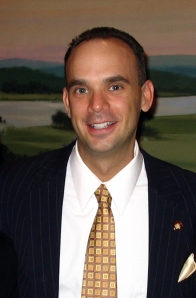Springfield’s Chancellor of the Exchequer…
UPDATED 7/14/14 4:02PM: For grammar, clarity, and additional quotes & links.
Welcome to the Sunday Feature: An effort to bring you lengthier, more in-depth stories on some Sundays.
SPRINGFIELD—“More than sufficient, the budget passes.”
Those six words from City Council President Michael Fenton on Jun 16 were an understatement. That day the city’s budget passed with no cuts and a unanimous Council. Domenic Sarno took some credit, but the outcome was partly a reflection of the faith in the city’s financial czar T.J. Plante.
Some weeks before when the mayor released the budget, it was mostly smiles and not gloom and doom. Even after looking at the fine print, the results appeared genuine—another win for Plante, 35.
Timothy Plante, Springfield’s Chief Administrative & Financial Officer or CAFO, perhaps the city’s top bureaucrat, has only held the job for thirteen months. If the smooth approval of the first budget he oversaw from beginning to end is any indication, things looks good for Plante and maybe the city, too. Amid the chronic problems that still bedevil Springfield, Plante’s successes echo the city’s own struggle out of the muck, fiscally and, in its workforce, professionally.
Righting Springfield’s sinking financial ship in 2004 had already been like turning an oil tanker around in a puddle and Plante’s predecessor, Lee Erdman, navigated it through part of the recession’s troubled waters. Thus, Plante may just be lucky, but those fiscal victories come with a good reputation, too.
Fenton, long a vociferous fiscal hawk said Plante has a “tremendous amount of credibility.” “He is probably the least popular employee in city hall and it is because he is good at his job,” Fenton said.
Sarno alluded to the same last year. “That’s the last standing ovation you’ll ever receive,” Masslive quoted Sarno saying. In a press release at the time, Sarno said, “T.J. has been an invaluable part of my Administration. His appointment ensures the recent tradition of strong financial management by a true financial professional will continue.” Sarno’s office did not respond to multiple requests for comment.
Police Commissioner John Barbieri, who as a deputy served on the CAFO search committee last year, said in an email Plante was ” forthcoming, easy to contact, informative and an asset.” During the search itself, Barbieri said there were many good candidates, but Plante “stood out” among them, a sentiment echoed by other search committee members.
That confidence in Plante and recognition of his professionalism may imply a new era of credentials, rather than connections for city staffing. That, consequently, prompts confidence in its bureaucracy. Smooth sailing for a budget or thumbs up from S&P and Moody are some of the proof.

Stephen Lisauskas (via stephenlisauskas.wordpress.com)
Stephen Lisauskas, a former Executive Director of the Control Board, participated in Plante’s initial hiring as budget director earlier in the Board’s tenure. He is “exceptionally hard working, very gifted, very interested in doing what was right for the citizens of Springfield and the city as a whole,” Lisauskas said.
The CAFO presides over Springfield’s financial and personnel divisions under a 2008 state law that devolved those powers from the mayor under the City Chater. The CAFO’s fiscal judgment is needed in virtually every case. In practice—at least since the law took effect—the literal buck stops with the CAFO. The political one proceeds to the mayor. The state created the position ahead of the Control Board’s departure, but many cities, including Boston, have similar jobs. Although answerable to mayors, these posts have statutory qualifications to combat cronyism and come with broad political latitude.
In Springfield’s case, the CAFO also formally appoints key positions in finance, revenue and personnel. To add political insulation, the CAFO has a three year term, although the mayor can dismiss the CAFO for cause. Plante has made only a few appointments so far, but in discharging his duties, many say he has exercised independence and good judgment.
Plante does have political juice by way of his father-in-law Philip Contant, a District Court Judge and former City Councilor. There is no evidence Plante has made use of Contant’s influence, though.
In an interview last year in his City Hall office, Plante said, “My job is pretty much apolitical. Either you have the money or you don’t.” He indicated that his role is to take the mayor’s priorities and offer suggestions on how execute them responsibly and legally.
“He is not afraid to say ‘I agree with you Councilor,’” Fenton said of Plante’s candor about how the mayor’s policy decisions may differ from Plante’s recommended path. “That is what the CAFO is supposed to do.” The trash fee is an ideal example. From a strictly fiscal point of view, charging residents the full cost of pickup to residents would be ideal. However, Plante and his predecessors have worked with the mayor and council to find more palatable alternatives.
Lisauskas echoed that assessment of Plante has been “very effective at working through the difficult political questions, while still maintaining the appropriate focus on the job he is doing.”

Sen. President Therese Murray (via dailyfreepress.com courtesy Mass Governor’s office)
Plante is no stranger to politics or navigating bureaucracy through it. After college Plante served as an aide to Fred Berry, a former senator from Plante’s native North Shore. He later worked as a Policy Analyst for Therese Murray when she was Chair of the Senate Ways and Means Committee. Her office did not return a request for comment. Plante veered away from overtly political paths and earned a masters in public administration from Suffolk University.
Plante met his wife, Kate, in Boston, but they eventually moved to her hometown to start their family, settling in the Forest Park area. About that time he applied to the budget position with the city. Plante would hold several positions as the city’s financial hierarchy was restructured. He served in the CAFO’s predecessor position on an interim basis for a time, but did not apply to be CAFO when first filled in 2009.
Plante was “a terrific candidate when he interviewed for the position,” Lisauskas said, who now works as a Vice-President at North Andover-based Waste Zero. Lisauskas said Plante was eventually put in charge of Finance with oversight over both the School Department and the rest of the city’s finances. Lisauskas said the School Committee was cool to the Board’s existence let alone the intervention in the schools. Well after the Control Board departed, though, the Committee extended the arrangement.
That period had its controversies and certainly labor was not always happy. Yet, Lisauskas said Plante was able to “demonstrate,” “communicate” and “reform” how officials viewed the schools budget (value vs. size of total spending). “All three of those brought together constitutes solutions,” during tight times Lisauskas said.
Plante has said the biggest challenge is meeting the long term obligations like retiree benefits and debt service while maintaining services. The debt taken on the late 1990’s, often unwisely, is coming due now. Even with additional bonding planned though, Plante expects debt payments to go down as the more expensive debt from that era is paid off.
Plante also has a hand in economic planning, as the growth of the city’s tax base is crucial to maintain services. “The casino is a big part of it, but it is not the only strategy.” During this year’s budget process, Plante said no casino cash is budgeted, but casino repeal could cause city finances to get “hairier,” in the future. Plante he has not used the same apocalyptic language about repeal as others have.
Plante emphasized capital improvement projects like repairs to Boston Road and Union Station. Those are moving now, while others wait on the casino. But with a half a billion backlog and issuing debt a high wire act, catching up on deferred maintenance is tough. “You need to pay your debt before payroll,” Plante said noting the risk of layoff if future debt payments exceed revenues in the future.
Plante has tussled with Beacon Hill budget-writers. Legislators often feel Springfield gets enough, but the devil is in the details of its $335 million in aide. “More attention needs to be paid attention to those details,” like its low property values and how most of that money is dedicated exclusively to education.
Overall Plante’s position on aid does not affect his standing in Boston. One state official who requested anonymity because his office does not comment on individual municipalities, said the city was lucky to have him and praised his “good relationship with the mayor” and “willingness to work with people.”
Although Sarno has been said to pitch explosive fits in meetings, he and Plante enjoy a notably good relationship. Sarno trusts Plante and will accept his judgment that something is fiscally impossible. Plante will also work with Sarno to find a way to make something possible.
As Sarno predicted, not everybody loves Plante, but most quarrels seem likely to be about a favored budget line getting level funded or a buddy being denied a raise.
Beyond his abilities, however, Plante has earned plaudits for accountability. When a hole opened in the budget for the long-operational new Putnam High School, bonding was needed to close the gap. Many held former Director of Capital Asset Construction Rita Coppola-Wallace responsible and federal subpoenas have hit her former office amid talk of wider-ranging probes.
“I’ll own this, we screwed up,” a source recalled Plante said, interrupting a meeting, “Rita’s gone. I was overseeing her at the time.”
“Never heard a department head say that. Nobody is ever wrong,” said the source, who was not authorized to speak on the matter and requested anonymity. “Plante showed some real leadership behind closed doors,” the source said.
Plante, who will turn 36 next month, is only at the beginning of his career. Already he makes one of the top salaries in the city at $152,500. That figure may seem high, but is low compared to his earning potential in other jobs. He is staying put for now, but he will have options going forward.
Lisauskas suggested he could easily take a position in Boston, another big city, or the private sector like the one he holds now, “His career path is going to be what he makes it.” His three children are young, but even if he waited until they were older to make a move, he would still have years left of working.
Clear challenges remain. The next big fiscal one is the city retirement system, which is woefully underfunded. The 2008 economic crisis and a shrinking payroll have wreaked havoc on the system.
The retirement system’s needs are as much an administrative problem and a political one, but they are also a reminder of immense challenges. Even if running well, the city’s bureaucracy cannot save the city alone. Vision, ambition and innovation must come from the political apparatus in order to address crime, economic development and livability.
But there is progress. The city’s bond rating is high (and borrowing cheaper) after being near junk status not long ago. Lisauskas, who keeps sporadic contact with Plante said the latter “was built for” this job.
Having made his career here, how is the ex-North Shore resident enjoying life in the 413? “The quality of life in Springfield is tremendous,” he said, noting “how much house” you can get for the price. His job aside, Plante has found things in Western Mass, “a little more laid back, a little less stressed.”





